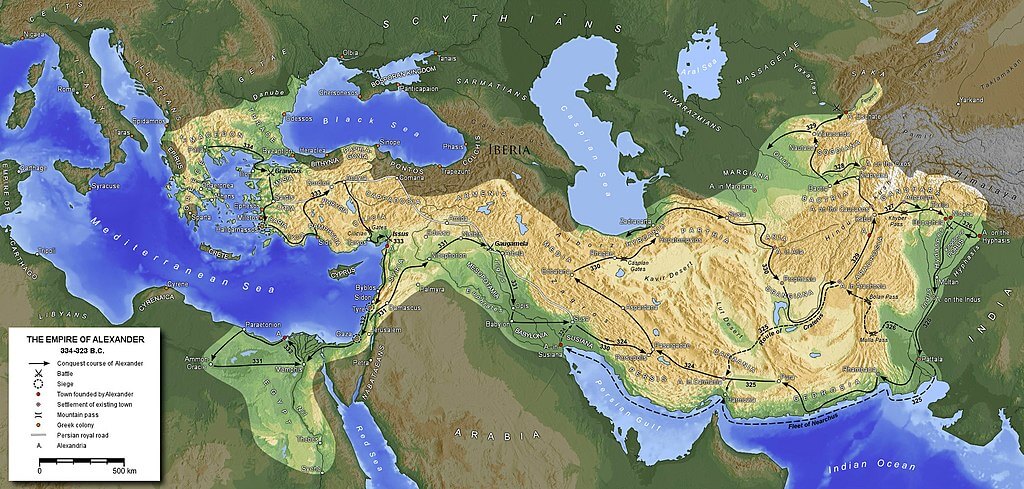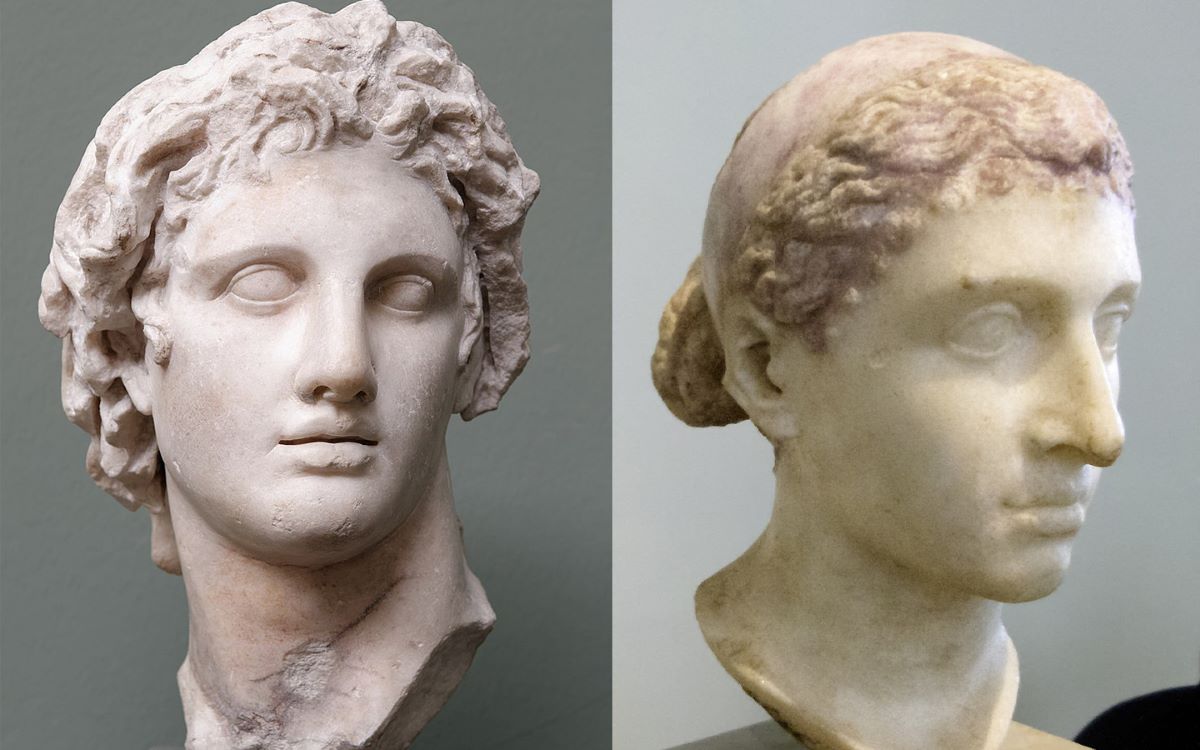Alexander the Great and Cleopatra – two names that have been forever etched into the annals of history. “Did Alexander the Great ever meet Cleopatra?” “Did Cleopatra marry Alexander the Great?” These are some of the intriguing questions often found on the internet, posed by a vast number of individuals. At first glance, especially to historians well-versed in this era, such queries may seem misplaced. After all, over 250 years of history separate Alexander the Great from Cleopatra VII.
Alexander the Great, born in 356 BCE in Pella, the ancient capital of Macedonia, and passing away in 323 BCE, is best known for his unparalleled military campaigns that expanded his empire from Greece through Asia Minor, Egypt, Persia, and into India. His conquests not only reshaped the political and cultural landscape of the ancient world but also paved the way for the Hellenistic civilization.

On the other hand, Cleopatra VII, born in 70/69 BCE in Alexandria, Egypt, ruled from 51 BCE to 30 BCE. She was the last Pharaoh of Ancient Egypt, renowned for her intelligence, political acumen, and romantic liaisons with notable Roman figures such as Julius Caesar and Mark Antony. Her life, filled with both power and tragedy, signified the end of the Ptolemaic dynasty and marked the beginning of Egypt’s period as a Roman province.
Alexander the Great and Cleopatra
While questions about a meeting between Alexander the Great and Cleopatra VII, the famous last Pharaoh of Egypt, may initially seem like historical inaccuracies, it’s not entirely incorrect to associate the name “Cleopatra” with Alexander. The name Cleopatra was, in fact, a common one in the annals of Ancient Greek history, particularly among the Macedonians. In the life of Alexander the Great, at least two women bore this name.
The first among them was his own sister, Cleopatra of Macedon. As the daughter of Philip II and Olympias, she was at the heart of many political intrigues and alliances. After the death of her brother Alexander, Cleopatra sought to play a role in the tumultuous politics of the time. It is well-documented that she sought to marry her brother’s former general, Leonnatus, but this was short-lived as he died in battle. Later, she had relations with another of Alexander’s former generals, Perdiccas, but this too ended in political strife. Cleopatra’s life was a testament to the turbulent period following Alexander’s death, and she ultimately met a tragic end.
The second Cleopatra associated with Alexander was indeed the woman whom his father, Philip II, intended to marry. This Cleopatra, also known as Cleopatra Eurydice of Macedon, was a member of the Macedonian aristocracy. Her marriage to Philip II caused a series of political tensions, as it meant their offspring could have claims to the Macedonian throne, potentially sidelining Alexander.
Alexander the Great and Cleopatra VII
Alexander the Great’s interaction with Egypt is a significant chapter in the expansive narrative of his conquests. His arrival in Egypt was generally welcomed, as the Egyptians had grown resentful of the Persians who had ruled them for almost two centuries. In 332 BCE, without much resistance, Egypt opened its gates to the Macedonian king, and Alexander was crowned as Pharaoh in the traditional Egyptian manner, which was a testament to his desire to be recognized not as a foreign conqueror but as a legitimate ruler of Egypt.
During his time in Egypt, Alexander undertook several actions that left enduring marks on the region. One of his most notable activities was visiting the Oracle of Siwa Oasis, where he was famously proclaimed as the “son of Zeus-Ammon,” bolstering his divine status in the eyes of both Greeks and Egyptians. In terms of city-building, Alexander founded the city of Alexandria, which, under his vision, was to serve as a fusion of Greek and Egyptian cultures. The city would eventually become one of the most prominent centers of learning, culture, and commerce in the ancient world.
Following Alexander’s death in 323 BCE, his vast empire was subject to disputes and divisions. Ptolemy, one of his trusted generals, managed to secure control over Egypt. In an act that combined both political savvy and reverence for his former leader, Ptolemy ensured that Alexander’s body was buried in Alexandria, further consolidating his rule by connecting his reign to the legacy of Alexander. This mausoleum, known as the Soma, became a famous monument, though its exact location remains a mystery to this day.
Regarding Cleopatra VII, while there is no direct evidence suggesting she ever visited Alexander’s tomb, her reign came centuries after Alexander’s death and during a period when his legacy was still palpable. Given her intelligence, political acumen, and the importance of lineage and history in her rule, it would not be far-fetched to assume that Cleopatra might have referenced or paid respect to the Macedonian king who, in many ways, shaped the destiny of her own Ptolemaic dynasty.
Thus, while Alexander the Great never met the famed Cleopatra VII of Egypt, his life was intertwined with the destinies of other women bearing the same name. This fact underscores the complexity and richness of ancient history, where names and personalities often span across centuries and empires.
Historical Challenge: Can You Conquer the Past?
Answer more than 18 questions correctly, and you will win a copy of History Chronicles Magazine Vol 1! Take our interactive history quiz now and put your knowledge to the test!

